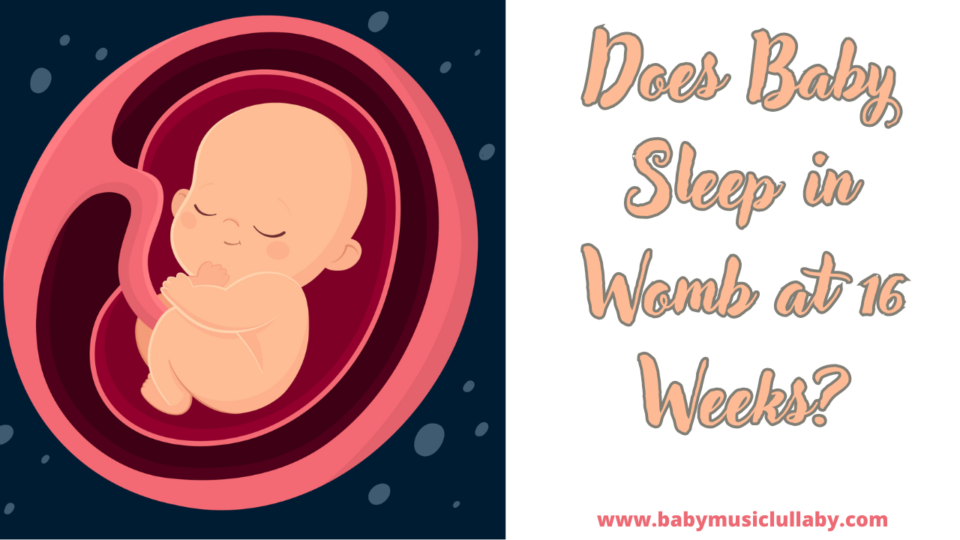Contents [hide]
Introduction
As expectant parents, one of the many wonders of pregnancy is how a baby grows and develops inside the womb. Among the numerous questions that arise during this miraculous journey, a common inquiry is, “Does Baby Sleep in Womb at 16 Weeks?” Understanding the sleep patterns of a developing fetus is both fascinating and essential to comprehend the early stages of life. In this comprehensive article, we will explore the topic of fetal sleep at 16 weeks, shedding light on the fascinating world of unborn babies. So, let’s dive in and discover the mysteries of fetal sleep!
Does Baby Sleep in Womb at 16 Weeks? Unveiling the Sleep Habits of a Fetus
At 16 weeks of gestation, your little one has reached a significant milestone in their development. While the sleep patterns of a fetus are not entirely like those of a newborn or an adult, it is safe to say that yes, babies do sleep in the womb at 16 weeks. However, it’s crucial to understand that fetal sleep is quite different from the sleep we experience outside the womb.
The Nature of Fetal Sleep
Fetal sleep is characterized by rapid eye movement (REM) and non-rapid eye movement (NREM) phases, much like the sleep cycles we experience after birth. Researchers have found that babies spend a significant portion of their time in the REM stage during the earlier stages of development. The REM phase is vital for brain development and is believed to play a role in memory consolidation and learning.
Sleep-Wake Patterns
Around 16 weeks, the baby’s sleep-wake patterns start to form, and they may have periods of more pronounced activity followed by rest. While it’s challenging to determine specific hours of sleep, you may notice some distinct periods of fetal movement followed by relative calmness, which indicates that your baby is resting.
Influence of Maternal Activities
Studies suggest that a mother’s activities can influence the sleep patterns of the fetus. When a mother is active or engaged in physical activities, the rhythmic motion may lull the baby to sleep. Conversely, when the mother is at rest, the absence of movement may allow the baby to wake up and become more active.
Soothing Sounds in the Womb
The womb is not a silent place for the baby. Inside the womb, the baby can hear various sounds, such as the mother’s heartbeat, the rushing of blood, and even external noises. Some experts believe that soothing sounds can help calm the baby and promote sleep during pregnancy.
Dreaming in the Womb?
One intriguing question is whether babies dream during fetal sleep. While there is no concrete evidence to support this, some experts believe that dreaming might be possible, given the brain activity observed during the REM phase. However, the true nature of dreams in the womb remains a subject of ongoing research and debate.
FAQs About Fetal Sleep
- Q: Can I Feel My Baby’s Movements While They Sleep at 16 Weeks?
- A: Feeling your baby’s movements at 16 weeks may not be as pronounced as it will be in later stages, but some mothers might still feel gentle flutters or quickening.
- Q: How Long Do Babies Sleep in the Womb at 16 Weeks?
- A: Babies do not have a structured sleep schedule like adults. They sleep and wake in cycles, which can vary in duration.
- Q: Can My Stress or Emotions Affect My Baby’s Sleep in the Womb?
- A: It is believed that a mother’s stress or emotions can influence the baby’s behavior, including sleep patterns. Practicing relaxation techniques may be beneficial for both mother and baby.
- Q: Is Fetal Movement During Sleep Normal?
- A: Yes, fetal movement during sleep is normal and should not be a cause for concern. It indicates that your baby is growing and developing.
- Q: Are There Recommended Sleeping Positions for Pregnant Mothers?
- A: As pregnancy progresses, sleeping on the left side is often recommended to improve blood flow to the baby and the uterus.
- Q: Should I Be Worried if My Baby Is More Active at Night?
- A: It is normal for babies to have periods of increased activity, which can occur more frequently at night. However, if you notice a sudden increase or decrease in movement, consult your healthcare provider.

Conclusion
As we delve into the fascinating world of fetal development, we discover that babies indeed sleep in the womb at 16 weeks. While their sleep patterns differ from those after birth, the REM and NREM phases play a crucial role in their growth and brain development. As expectant parents, it’s essential to embrace the marvels of pregnancy and be mindful of the factors that influence your baby’s well-being. By understanding fetal sleep and being attuned to your baby’s movements, you can nurture a healthy and loving bond even before they enter the world.
So, as you embark on this extraordinary journey of parenthood, remember to cherish every moment, knowing that your baby is dreaming peacefully in the safety of your womb.

 Subscribe to Get Soothing Lullabies to Help Your Baby to Sleep
Subscribe to Get Soothing Lullabies to Help Your Baby to Sleep